新概念课堂笔记 第一册 Lesson 133-134
新概念第一册(1)133-134课

D B
B
.
Thank you!
.
They. said that
III.将下列句子变成“一般疑问句“(注意时态) 1. She is sleeping at home. 2. He can ride a bike. 3. Paul likes swimming. 4. She often does her housework in the morning. 5. I played basketball yesterday. 6. It is going to rain this afternoon. 7. Lucy was at school last Monday. 8. He watched TV last night.
3. Mink coat /miŋk/ [miŋk] 貂皮大衣
.
★wonder = want to know 后面常跟由特殊疑问词(why/ what/who/where/when/how等) 组成的句子
I wonder why. I wonder who Yang mi is.
★arrive in(大地方)/ arrive at(小地方)
★当动词所表示的状态或或动作在引述时仍在继续时 : “I’m forty,” heisaid. →He said he ___ forty. 他说他40了。
★当引述的是客观事实,科学真理及格言等: He said, “the sky is blue.” →He said the sky __i_s_ blue.
II.将下列句子变成间接引语 1. Tom said,“I’m watching TV.”
Tom said that 2. He said,“I’ve lost my bike.”
新概念英语第1册Lesson133~140课文详注

【导语】新概念英语⽂章短⼩精悍,语句幽默诙谐,语法全⾯系统。
适合各个阶层的⼈群学习参考。
相信有了新概念英语,你也可以成为“⼤神”级别的⼈物!还在等什么?快来加⼊学习吧!⼩编与您⼀起学习进步!新概念英语第1册Lesson133~134课⽂详注 1.Have you just made a new film, Miss Marsh? 您刚拍完⼀部电影吗,马什⼩姐? make 可表⽰“作出某种举动”,其意义根据宾语⽽定。
本句中的make可理解为“拍(摄)”。
2.make another,再拍⼀部。
之后省略了film。
3.by our reporter = written by our reporter。
新概念英语第1册Lesson135~136课⽂详注 1.He won't let me make another film.他不会再让我拍电影了。
句中动词let后⾯的不定式不带to,类似的例⼦如动词have,make等。
2.introduce A to B,将A介绍给B,向B介绍A。
3.get married,结婚。
4.the latest,最新消息。
5.…she would have to ask her future husband. …她得问问她的未婚夫。
这部分是从句,在整句话中作said的直接宾语。
would have to ask是过去将来时结构。
因为主句的谓语动词是said,相对过去的这⼀时间点的将来就是过去的将来,所以⽤过去将来时结构。
新概念英语第1册Lesson137~138课⽂详注 1.do the football pools,下⾜球赛的赌注。
football pools 是英国流⾏的⼀种赌博⽅式,靠在⾜球⽐赛结果上的赌注来决定输赢。
2.What will you do if you win a lot of money?如果你赢了许多钱,你打算做什么呢? if you win a lot of money是⼀个表⽰条件的状语从句。
新概念英语第一册133-134课(共22张PPT)

• ★retire: • v. 退休 • retire from:从…上退休 • adj. retired 退休的 • retired workers 退休工人
Page 6
Mink coat [miŋk] 貂皮大衣
•arrive in(大地方) •arrive at(小地方)
Sensational news: Director Zhang said he was going to retire.
Listen and answer
1.Who is Miss Marsh? 2.Has she made a new film? 3.Is she going to make a film? 4.Where did Miss Marsh arrive? 5.What was Miss Marsh wearing?
直接引语间接引语?一般现在时一般过去时?一般过去时过去完成时?现在完成时过去完成时?现在进行时过去进行时?一般将来时过去将来时间接引语时间状语和地点状语的变化
Lesson 133-134. Sensational news!
爆炸性新闻!
主要语法点: He said (that) he…他曾说他… He told me (that) he…他曾告诉我说他…
She was wearing a blue dress. wear v. 穿(状态) wear the uniform
put on 穿(动作)
be in +颜色 穿什么颜色的衣服
dress v. 穿(某人) dress oneself 自己穿衣服
Finish the story
Alan Jones, a reporter from CNN is visiting the famous director Karen Marsh in _mink coat (貂皮大衣).
新概念英语第一册第133-134课重点语法

第133-134课的内容: ⼀、重要句型或语法 1、间接引语 本课继续学习间接引语的⽤法,但侧重的是当主句谓语动词采⽤⼀般过去时的⽤法,此时当直接引语改为间接引语时,直接引语中的谓语动词要改为相应的过去时态,本课⾥出现的情况有:⼀般现在时改为⼀般过去时;现在进⾏时改为过去进⾏时;现在完成时改为过去完成时。
如: She told me she had just made a new film. She said she was not going to make another. She told reporters she felt very tired and didn't want to make another film for a long time. ⼆、课⽂主要语⾔点 Have you just made a new film, Miss Marsh? Yes, I have. 1)可复习⼀下现在完成时的基本⽤法。
2)make a film,拍电影。
Are you going to make another? No, I'm not. I'm going to retire. I don't want to make another film for a long time.1)another表⽰另⼀个,后⾯省略了film。
2)for a long time,很久。
Karen Marsh: Sensational News! By our reporter, Alan Jones. 1)可介绍⽂章标题的格式分类及其要求。
此处的标题在⼈名Karen Marsh加上冒号,起到提⽰补充作⽤。
⽽sensational news以感叹号结尾,则起着抓眼球的作⽤,⽤来引起读者的注意。
2)sensational,耸⼈听闻的。
该词来源于sensation。
3)by our reporter意思是该⽂章是由our reporter写的。
新概念英语第一册Lesson133134Sensationalnews小学英语初中英语全国通用
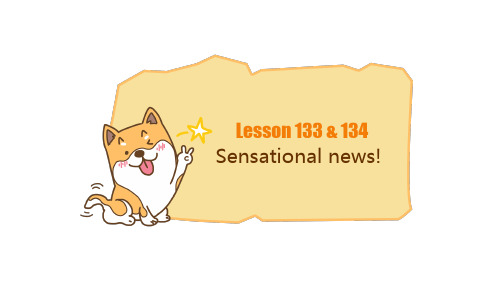
Language Point
语句讲解、课文讲解
同学们 , 请对照教材听老师讲解!
1. Karen Marsh : I have just made ... → She told me she had just...
B : No, not long, but my brother has been in the firm for a long time. 不,我在这里工作的时间不长 , 但是我弟弟在这家公司工作 的时间很久了。
Language Point
语句讲解、课文讲解
疑问句: Have you been working here long? 你在这里工作很久了吗? Do you know her parents long? 你认识她父母很久了吗?
查看答案解析
答案:retire; 解析: 动词辨义. retire v. 退休 , 退职; report v. 报告 , 报导; design v. 设计,计划; desire v. 渴望,向往;要求; 译文:那位老工人决定退休后搬到乡下去。
下一题
根据给出的单词首字母用本课所学单词填空 , 请写出完整单词。 The r_______ was killed because he tried to expose a plot.
adv. 很长一段时间
Warm-up
课前热身
Let's... 让我们···
Let's do sth. Let's = Let us → 表示提议、建议、命令、请求 e.g. Let's go! 我们走!
Listening
裕兴新概念英语第一册笔记:Lesson 133 Sensational new
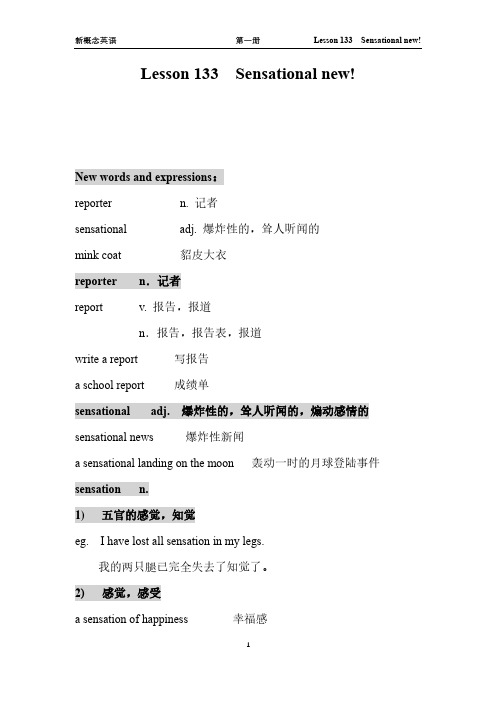
Lesson 133 Sensational new!New words and expressions:reporter n. 记者sensational adj. 爆炸性的,耸人听闻的mink coat貂皮大衣reporter n.记者report v. 报告,报道n.报告,报告表,报道write a report写报告a school report成绩单sensational adj. 爆炸性的,耸人听闻的,煽动感情的sensational news爆炸性新闻a sensational landing on the moon 轰动一时的月球登陆事件sensation n.1)五官的感觉,知觉eg. I have lost all sensation in my legs.我的两只腿已完全失去了知觉了。
2) 感觉,感受a sensation of happiness幸福感have a sensation of faintness 感到好像要昏过去了3) 轰动,轩然大波eg. The news created a great sensation.那个消息起一场轩然大波。
mink coat貂皮大衣mink1) 指貂皮(不可数名词)2) 水貂(可数名词)Text:QuestionWhat reasons did Karen Marsh give for wanting to retire?卡伦・马什说她为什么想要退休?A: Have you just made a new film, Miss Marsh? B: Yes, I have.您刚拍完一部电影吗?马什小姐。
1) to make a film 制作一部影片,拍摄一部电影to shoot the pictures摄影2)have madehave (助动词)+ 过去分词构成现在完成时just “刚刚”,表示动作完成不久eg. I have just come back. 我刚回来。
新概念英语Lesson 133-134讲义

新概念一讲义Lesson 133 Sensational news!New words1. report (v.)+er =reporter (n.)2. 通常动词加-er变成名词work (v.) + er = worker (n..)3. sensational a. 爆炸性的sensation n. 感觉 a ~ of happiness 4. wonder n. 奇迹v. 想知道(新2 第25课)eg: I wonder what time it is.wonderful a. 精彩的,极好的Text :1. another +单数可数名词eg: ~ appleother+ 复数名词other two students o ne…the other 一个````另一个(限两者)I have two pens. One is red, the other is black.Lesson134 He said(that) he…He told me(that) he…Grammar :间接引语直接引语(宾语)1 直接引语:一字不改地引述别人的话2 间接引语:用说话人自己的语言转述别人的话3 常用动词;say, tell, ask, reply4 直接引语一般置于“”/ ‘’,间接引语通常在句中以宾语从句的形式出现He said, “I get up early in the morning.”He said that he got up early in the morning.如果直接引语变间接引语应有相应的人称和时态的变化注:宾语从句中如果主句是一般过去时从句要用相对应的过去时1一般现在时-----一般过去时2 现在进行时----- 过去进行时3 一般将来时------过去将来时4 一般过去时------过去完成时5 现在完成时------过去完成时Eg: 1. The mouse said to Rice, “ I love you.”The mouse said to Rice that he loved her.2. The mouse said to Rice, “ I am loving you.”The mouse said to Rice he was loving her.3. The mouse said to Rice, “I will love you.”The mouse said to Rice he would love her4. The mouse said to Rice, “I loved you.”The mouse said to Rice he had loved her.5. The mouse said to Rice, “ I have loved you.”The mouse said to Rice he had loved her.Exercises:一、把下列直接引语的句子转化成间接引语。
新概念英语第一册课文翻译及学习笔记Lesson129~134
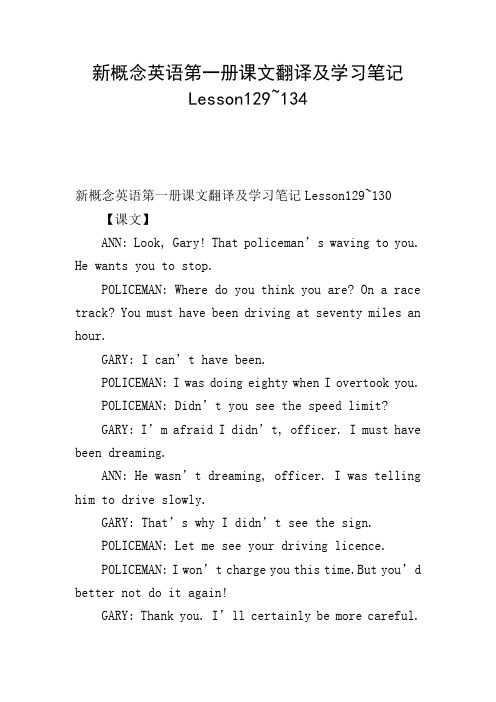
新概念英语第一册课文翻译及学习笔记Lesson129~134新概念英语第一册课文翻译及学习笔记Lesson129~130 【课文】ANN: Look, Gary! That policeman’s waving to you. He wants you to stop.POLICEMAN: Where do you think you are? On a race track? You must have been driving at seventy miles an hour.GARY: I can’t have been.POLICEMAN: I was doing eighty when I overtook you.POLICEMAN: Didn’t you see the speed limit?GARY: I’m afraid I didn’t, officer. I must have been dreaming.ANN: He wasn’t dreaming, officer. I was telling him to drive slowly.GARY: That’s why I didn’t see the sign.POLICEMAN: Let me see your driving licence.POLICEMAN: I won’t charge you this time.But you’d better not do it again!GARY: Thank you. I’ll certainly be more careful.ANN: I told you to drive slowly, Gary.GARY: You always tell me to drive slowly, darling.ANN: Well, next time you’d better take my advice!【课文翻译】安:瞧,加里!那个警察正朝你挥手呢。
新概念英语第一册第133-134课

• • • • • • • • • •
'Karen Marsh: Sensational News! By our reporter, Alan Jones. by表示动作的执行者 培根写的一本书 a book by Bacon Karen Marsh arrived at London Airport today. arrive at 到达,小地方 arrive in 到达,大地方 我们周五到达英国,首先我们达到了伦敦。 I arrived in England on Friday. We first arrived at London.
• just now “刚才” • 我刚才还看见他 • I saw him just now.
• • • • • • • • •
Are you going to make another? No, I'm not. another 不定代词 I’m going to retire. Retire 退休 1974年,他从博物馆退休了。 In 1974 he retired from the museum. I fell very tired. 你觉得热吗? Do you feel hot?
text appreciation
• • • • • • Have you just made a new film? Yes, I have. to make a film 制作一部影片,拍摄一部电影 just “刚刚“,表示动作完成不久 我刚回来。 I have just come back. 我刚去过纽约。
• I don't want to make another film for a long time. • want to do sth 想要做某事 • want sb to do sth 要某人做某事 • • • • for a long time for 表示时间持续的长短,可用于任何时态。 我在那呆了3天 I stayed there for 3 days.
新概念133-134课(第一课时)

我们去游泳吧!Let’s go swimming! 7. Listen to this!
listen to 听,表听的动作 listen不及物动词,接宾语时必须加介词,构成及物动词短语。 听,这是什么声音?你能听到吗? Listen! What's that noise? Can you hear it?
她经常穿着绿色衣服
She always wears green.
put on “穿上“,表“穿上”的动作
她穿上外套出去了。
She put on her coat and went out.
dress “给…穿衣”,对象是人,而非衣物
她先给孩子穿好衣服,然后又为自己穿上衣服。
She dressed her baby first, and then dressed herself.
8. 'Karen Marsh: Sensational News! By our reporter, Alan Jones.
by表示动作的执行者,意为“由….”或“被…”
培根写的一本书 a book by Bacon
9. Karen Marsh arrived at London Airport today. arrive at 到达,通常表示到达一个较小的地方 arrive in 到达,通常表示到达一个较大的地方
the others 在一定范围内其余所有的人或物
Some people like running, __o_t_h_e_r_s like swimming.
Thirty of them are boy students and __t_h_e _o_th_e_rs_ are girls.
2020最新新概念英语第一册Lesson133~138语法及单词解析

新概念英语第一册Lesson133~134语法及单词解析语法 Grammar in use需改变时态的间接陈述句间接引语里常要改变时态,这是因为原来讲的话与转述这些话之间有一段间隔。
选择哪种恰当的形式取决于转述者的着眼点。
在间接引语里通常并不确切地重复讲话者说过的话。
转述通常发生在过去,所以引述动词通常是过去时。
因此,转述时从句的时态通常要“往回移”(back shift)。
一条普遍的规则是:现在时变为过去时,过去时变为过去完成时。
为过去时的情态助动词和过去完成时在转述时不变,因为不可能再往回移了。
使用间接引语主要是为了简洁、紧凑地把说话内容转述给第3者。
请看下面直接引语变成间接引语时在时态等方面必须作出的相应变化:(1)一般现在时改为一般过去时:‘I'm thirsty,’she said.“我渴了”她说。
She said (that) she was thirsty.她说她渴了。
(2)现在进行时改为过去进行时:‘I'm having a rest,’ she told them.“我正在休息”她告诉他们。
She told them (that) she was having a rest.她告诉他们说她当时正在休息。
(3)现在完成时改成过去完成时:‘I've just made a new film,’ she told me.“我刚完成一部新电影”她告诉我。
She told me(that) she had just made a new film.她告诉我说她刚完成一部新影片。
(4)一般将来时改成过去将来时(一般用would +动词原形):‘I'll have to ask my husband,’she said.“我得问问我丈夫”她说。
She said (that) she would have to ask her husband. 她说她将得去问问她丈夫。
新概念英语第一册自学笔记含课后练习答案:Lesson 133-134
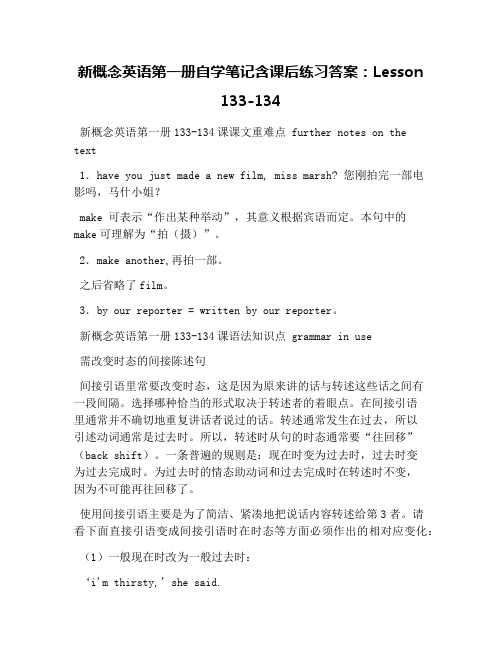
新概念英语第一册自学笔记含课后练习答案:Lesson133-134新概念英语第一册133-134课课文重难点 further notes on thetext1.have you just made a new film, miss marsh? 您刚拍完一部电影吗,马什小姐?make 可表示“作出某种举动”,其意义根据宾语而定。
本句中的make可理解为“拍(摄)”。
2.make another,再拍一部。
之后省略了film。
3.by our reporter = written by our reporter。
新概念英语第一册133-134课语法知识点 grammar in use需改变时态的间接陈述句间接引语里常要改变时态,这是因为原来讲的话与转述这些话之间有一段间隔。
选择哪种恰当的形式取决于转述者的着眼点。
在间接引语里通常并不确切地重复讲话者说过的话。
转述通常发生在过去,所以引述动词通常是过去时。
所以,转述时从句的时态通常要“往回移”(back shift)。
一条普遍的规则是:现在时变为过去时,过去时变为过去完成时。
为过去时的情态助动词和过去完成时在转述时不变,因为不可能再往回移了。
使用间接引语主要是为了简洁、紧凑地把说话内容转述给第3者。
请看下面直接引语变成间接引语时在时态等方面必须作出的相对应变化:(1)一般现在时改为一般过去时:‘i'm thirsty,’she said.“我渴了,”她说。
→she said (that) she was thirsty.她说她渴了。
(2)现在实行时改为过去实行时:‘i'm having a rest,’ she told them.“我正在休息,”她告诉他们。
→she told them (that) she was having a rest.她告诉他们说她当时正在休息。
(3)现在完成时改成过去完成时:‘i've just made a new film,’ she told me.“我刚完成一部新影片,”她告诉我。
新概念英语第一册Lesson133-134笔记(语法点+配套练习+答案)
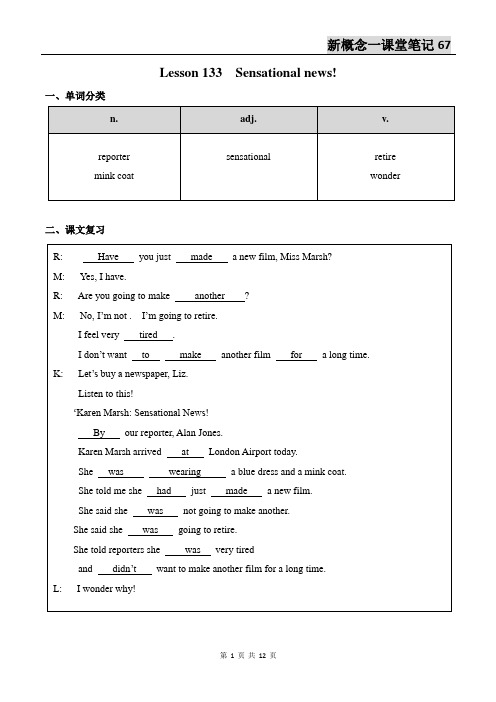
Don’t speak aloud. Hehasjustslept(sleep).
Imet(meet) an old friend in the street just now.
I feel very tired.我感觉很累。
feel,系动词,后跟形容词
Turn on the air-conditionerimmediately .
我们庆祝爷爷退休。
reporter n.记着
report v.报道
It is reported that ...据报道
John is anews reporter.John是个新闻记者。
It isreported(reported, reporting)that the thief was caught two hours ago.
Lesson 133 Sensational news!
1、单词分类
n.
adj.
v.
reporter
mink coat
sensational
retire
wonder
2、课文复习
3、课文重点
重点
练习
retire v.退休
retire from ...从...退休
n.retirement来自构词法:v.+ ment = n.
听,这是什么声音?你能听到吗?
Yousoundterrible. Do you have a sore throat?
by sb.被,由
a book writtenbyBacon培根写的一本书
The boywas hitbya ball.男孩被球打。
The news is reportedbyhim.新闻被他报道。
新概念英语第一册课文翻译及学习笔记Lesson133~138

【导语】为了⽅便同学们的学习,为您精⼼整理了“新概念英语第⼀册课⽂翻译及学习笔记Lesson133~138”,希望有了这些内容的帮助,可以为⼤家学习新概念英语提供帮助!如果您想要了解更多新概念英语的相关内容,就请关注吧!新概念英语第⼀册课⽂翻译及学习笔记Lesson133~134 【课⽂】 Reporter: Have you just made a new film, Miss Marsh? Miss Marsh: Yes, I have. Reporter: Are you going to make another? Miss Marsh: No, I'm not. I'm going to retire. I feel very tired. I don't want to make another film for a long time. Kate: let's buy a newspaper, Liz. Listen to this! "Karen Marsh: Sensational News! By our reporter, Alan Jones. Karen Marsh arrived at London Airport today. She was wearing a blue dress and a mink coat. She told me she had just made a new film. She said she was not going to make another. She said she was going to retire. She told reporters she felt very tired and didn't want to make another film for a long time." Liz: I wonder why! 【课⽂翻译】 记者:您刚拍完⼀部新电影吗,马什⼩姐? 马什⼩姐:是的,我刚拍完。
新概念课堂笔记第一册Lesson133-134

新概念课堂笔记第一册Lesson133-134 Word Studyreporter【用法】n. 记者【扩展】report v. 报道;公布n. 报告;成绩报告单【词组】weather report 天气预报sensational【用法】adj. 爆炸性的,耸人听闻的(贬)令人兴奋的;轰动性的专门好的;给人深刻印象的(口)【扩展】sense n. 感受,感官sensation n. 感受(富有感情的);感受sensitive adj. 敏锐的;灵敏sensible adj. 明智的【例句】He has a sense of hu mor. 他有幽默感。
She has sensitive ski n. 她的皮肤敏锐。
It is sensible of you to leave that company. 你离开那家公司是明智的。
【同义】wonderful adj. 太好了;杰出的excellent adj. 好极了;优秀的great adj. 棒极了;伟大的fantastic adj. 极好的;不切实际的【例句】The sensational news report didn’t have much effect on them. 那起耸人听闻的新闻报道对他们并无多大阻碍。
The discovery was se nsational. 那个发觉引起了轰动。
She looks sensational in that dress! 她穿那条裙子的模样真令人难忘!Text ExplanationI don’t want to make another film for a long time.【译文】我早就不想再拍片子了。
【用法】○1make a film 拍电影;make another film 再拍一部电影动词make与不同的宾语搭配有不同的含义,如:make t ea 沏茶;make the bed 铺床○2for a long time专门长时刻;用for + 段时刻瞬时性动词不能与段时刻搭配,需作变换,然而在否定句中是能够的。
新概念英语一lesson133-134(共21页)

• 三、宾语从句的语序 • 宾语从句的语序是陈述句语序即:连接 代词/副词+主语+谓语+其他成分。例句 如下: 1.I don't know what they are looking for. 2.Could you tell me when the train will leave? 3.Can you imagine what kind of man he is?
• 五、宾语从句的特点 • 1. 宾语从句可以作及物动词、介词及形容词的 宾语。 2. 宾语从句的语序一律用陈述句语序。 3. 连接词that引导宾语从句在句中无词义,不 充当句子成份,多数情况下可以省略。 4. whether和if都可引导宾语从句,但whether后 可紧跟or not;whether从句可作介词的宾语。 5. 如果从句太长,可以用形式宾语it。
• 四、宾语从句的时态 • 1. 主句是一般现在时,从句根据实际情况使用 任何时态。 例句:The headmaster hopes everything goes well. • 2. 主句是过去时态,从句须用过去时态的某种 形式。 例句:She was sorry that she hadn’t finished her work on time. • 3. 当宾语从句表示的是一个客观真理或者事实 时,即使主句是过去时,从句也用一般现在时 态。 例句:The teacher told his class that light travels faster than sound.
• 4. The teacher said, “The sun rises in the east and goes down in the west.” • The teacher said that the sun ______ in the east and ______ down in the west. • 5. “I met her yesterday.” he said to me. • He ______ me that he ______ her the day ______. • 6. “You must come here before five.” he said. • He said that I ______ to go ______ before five.
- 1、下载文档前请自行甄别文档内容的完整性,平台不提供额外的编辑、内容补充、找答案等附加服务。
- 2、"仅部分预览"的文档,不可在线预览部分如存在完整性等问题,可反馈申请退款(可完整预览的文档不适用该条件!)。
- 3、如文档侵犯您的权益,请联系客服反馈,我们会尽快为您处理(人工客服工作时间:9:00-18:30)。
新概念英语课堂笔记第一册Lesson 133-134
reporter
【用法】n. 记者
【扩展】report v. 报道;公布
n. 报告;成绩报告单
【词组】weather report 天气预报sensational
【用法】adj. 爆炸性的,耸人听闻的(贬)
令人兴奋的;轰动性的
非常好的;给人深刻印象的(口)【扩展】sense n. 感觉,感官
sensation n. 感觉(富有感情的);感受
sensitive adj. 敏感的;灵敏
sensible adj. 明智的
【例句】He has a sense of humor. 他有幽默感。
She has sensitive skin. 她的皮肤敏感。
It is sensible of you to leave that company. 你离开那家公司是明智的。
【同义】wonderful adj. 太好了;精彩的
excellent adj. 好极了;优秀的
great adj. 棒极了;伟大的
fantastic adj. 极好的;不切实际的
【例句】The sensational news report didn’t have much effect on them. 那起耸人听闻的新闻报道对他们并无多大影响。
The discovery was sensational. 那个发现引起了轰动。
She looks sensational in that dress! 她穿那条裙子的样子真令人难忘!
I don’t want to make another film for a long time.
【译文】我早就不想再拍片子了。
【用法】○1make a film 拍电影;make another film 再拍一部电影
动词make与不同的宾语搭配有不同的含义,如:make tea 沏茶;make the bed 铺床○2for a long time很长时间;用for + 段时间
瞬间性动词不能与段时间搭配,需作变换,但是在否定句中是可以的。
如:
His grandfather has been dead for 20 years. 他祖父去世20年了。
We haven’t bought any clothes for 3 years. 我三年都没买新衣服了。
The soldier hasn’t come back home for 2years. 这个士兵两年都没回家了。
By our reporter.
【译文】由本报记者报道。
【用法】by our reporter = (It is) Reported/written by our reporter.
本句是被动语态的省略说法,被动语态的结构为be done。
I wonder why!
【译文】我想知道为什么!
【用法】动词wonder = want to know “想知道”;
wonder后接宾语从句,wonder why/how/who/when/where …
本文中出现的间接引用的句子
需改变时态的间接引语
【介绍】直接引语变间接引语时常要改变时态,这是因为原来讲的话与转述这些话之间有一段时间间隔。
主句中的谓语动词如果是过去时态,间接引语的时态通常要“往回移”。
【用法】(1)一般现在时变成一般过去时,现在进行时变成过去进行时,现在完成时变成过去完成时。
○1She said, “I am a teacher.”她说:“我是个老师。
”
She said that she was a teacher. 她说她是个老师。
○2He said, ”We are having dinner.”他说:“我们正在吃饭。
”
He said that they were having dinner. 他说他们正在吃饭。
○3She said, “I have finished my homework.”她说:“我已经做完作业了。
”
She said that she had finished her homework. 她说她已经做完作业了。
注意:如果直接引语时客观真理,一般现在时则不变。
○4She said, “The moon travels around the earth.”她说:“月球环绕地球转。
”
She said that the moon travels around the earth. 她说月球环绕地球转。
(2)一般过去时变为过去完成时,过去完成时则不变,仍是过去完成时。
○1She said to me, “I saw you last week.”他对我说:“我上周见到你了。
”
She told me that she had seen me the week before. 他告诉我她上周见到我了。
○2He said, “I had watered the garden before supper.”他说:“我已经在晚饭前浇过花园了。
”
He said that he had watered the garden before supper. 他说他已经在晚饭前浇过花园了。
注意:直接引语中的一般过去时如果与一个具体的过去时间连用,一般过去时可不变。
○3Mum told me, “The museum was built in 1979.”妈妈告诉我:“这家博物馆建于1979年。
”
Mum told me that the museum was built in 1979. 妈妈告诉我说这家博物馆建于1979年。
(3)一般将来时变成过去将来时,将来进行时变成过去将来进行时,将来完成时变成过去将来完成时。
○1She said, “I’ll go there.”她说:“我会去那儿。
”
She said that she would go there. 她说她会去那儿。
○2She said, “I shall be working tonight.”她说:“我今晚将工作。
”
She said that she would be working that night. 她说她那天晚上要工作。
○3She said, “We shall have finished the work by next month.”她说:“到下个月,我们就会完成工作。
”
She said that they would have finished the work by the next month. 她说下个月他们就能完成工作了。
汇总:时态的改变对应规则。
